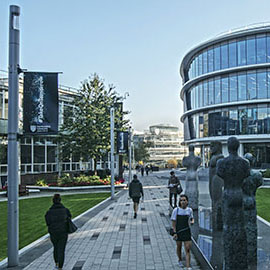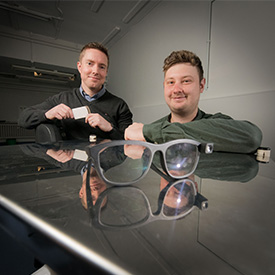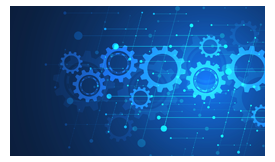-
Study
Study
Interested in studying at Northumbria? With 31,500 students, Northumbria is one of the largest universities in the country, offering courses on either a full-time, part-time or distance learning basis.
Discover more-
Undergraduate
- Undergraduate Study Degree
- Undergraduate Open Day & Events
- Application Guides
- Northumbria University UCAS Exhibitions
- Foundation Years
- Undergraduate Fees & Funding
- School & College Outreach
- Continuing Professional Development
-
Postgraduate
- Postgraduate Study Degree
- Postgraduate Research Degrees
- Postgraduate Open Days and Events
- Postgraduate Fees & Funding
- Flexible Learning
- Thinking about a Masters?
- Continuing Professional Development
- Change Direction
-
Student Life
- The Hub - Student Blog
- Accommodation
- Life in Newcastle
- Support for Students
- Careers
- Information for Parents
- Students' Union
- Northumbria Sport
-
-
International
International
Northumbria’s global footprint touches every continent across the world, through our global partnerships across 17 institutions in 10 countries, to our 277,000 strong alumni community and 150 recruitment partners – we prepare our students for the challenges of tomorrow. Discover more about how to join Northumbria’s global family or our partnerships.
Discover more-
Applying to Northumbria
- European Union
- Our London Campus
- Northumbria Pathway
- International Events
- Entry Requirements
- Agent Network
-
Northumbria Language Centre
- Faculty Requirements
- Acceptable English Requirements
- Pre-Sessional English and Study Skills
- Academic Language Skills Programmes (ALS)
-
International Fees, Funding & Scholarships
- International Undergraduate Fees
- International Undergraduate Funding
- International Masters Fees
- International Masters Funding
- International Postgraduate Research Fees
- International Postgraduate Research Funding
- International Money Matters
-
Life at Northumbria
- International student support
- The Hub - Student Blog
- Careers
-
International Mobility
- Current Northumbria Students
- Incoming Exchange Students
-
-
Business
Business
The world is changing faster than ever before. The future is there to be won by organisations who find ways to turn today's possibilities into tomorrows competitive edge. In a connected world, collaboration can be the key to success.
Discover more -
Research
Research
Northumbria is a research-rich, business-focused, professional university with a global reputation for academic quality. We conduct ground-breaking research that is responsive to the science & technology, health & well being, economic and social and arts & cultural needs for the communities
Discover more -
About Us
-
About Northumbria
- Our Strategy
- Our Staff
- Our Partners
- Student Profiles
- Alumni Profiles
- Leadership & Governance
- Academic Departments
- University Services
- History of Northumbria
- Contact us
- Online Shop
-
-
Alumni
Alumni
Northumbria University is renowned for the calibre of its business-ready graduates. Our alumni network has over 236,000 graduates based in 178 countries worldwide in a range of sectors, our alumni are making a real impact on the world.
Discover more - Work For Us
What will I learn on this module?
This module aims to make use of the knowledge and analytic skills developed throughout the programme to design modern digital signal processing systems.
In this module you will learn:
• The fundamental concepts of discrete-time signals and systems.
• The fundamental mathematical transforms for time-domain and frequency domain representations.
• The design of digital filters; finite impulse filter and infinite impulse filter.
• The practical implementation of digital filters in simulation and hardware.
How will I learn on this module?
In this module, you will learn via a number of activities:
• Weekly lectures, where main concepts are introduced.
• Fortnightly seminars, where the main concepts are applied.
• Fortnightly Workshops, where the design of filters are implemented.
• Independent learning via directed scripts, where the software and hardware are introduced.
How will I be supported academically on this module?
All the notes, seminar sheets, workshop scripts and directed learning are available at all times via eLP.
In addition, there will be a fixed weekly slot where you can drop in to see the lecturers.
Problem solutions will be provided after the tutorials and past-year examination papers are made available to all students via eLP.
Feedback on your learning will take the form of verbal feedback during the tutorials and laboratory sessions. Examination feedback will be provided following the normal processes.
What will I be expected to read on this module?
All modules at Northumbria include a range of reading materials that students are expected to engage with. The reading list for this module can be found at: http://readinglists.northumbria.ac.uk
(Reading List service online guide for academic staff this containing contact details for the Reading List team – http://library.northumbria.ac.uk/readinglists)
What will I be expected to achieve?
Knowledge & Understanding:
1. Demonstrate the understanding of key DSP principles in the design of DSP systems application for real world problems. (AHEP4: C1, C2, C5, M5)
Intellectual / Professional skills & abilities:
2. Mathematically model DSP system to characterise and critically evaluate its theoretical and practical performance. (AHEP4: C3, C4)
3. Simulate test signals and DSP systems using computational tool and practical lab equipment (AHEP 4 C12, M12).
Personal Values Attributes (Global / Cultural awareness, Ethics, Curiosity) (PVA):
4. Critically evaluate the practical limitations of hardware in filter designs and appreciate the need for low cost practical implementation. (AHEP4: C5, C7, C13, C14,M13, M14 )
How will I be assessed?
Formative Assessment:
Each of the 6 workshop sessions will contain a script with a series of tasks in line with the module LO1, LO2, LO3 and LO4. The two-hour workshop session will be supervised by a tutor and you will have two weeks to complete the script. At the start of the next workshop session, the formative feedback will be uploaded to blackboard.
Summative Assessment:
The summative assessment of this module is made up of 100% examination (EXAM). This will cover LO1, LO2, LO3 and LO4
This is a 3-hour examination with 10-minutes reading time.
The examination paper will contain 2 sections; Section A and Section B. Each section is worth 50% of the module mark.
Each section will be made up of 3 questions.
You are required to answer 2 questions from each section, i.e. two question from Section A and two questions from Section B.
Pre-requisite(s)
N/A
Co-requisite(s)
N/A
Module abstract
Digital signal processing is essential in all electrical and electronics devices, and more pertinently in smartphones and tablets. In this module you will learn the fundamental of digital signals and how they are processed to result in a clear video or voice call in your smartphone.
You will develop analytic skills to design key components of a modern digital signal processing systems and implement it in software and hardware platforms.
In this module, you will attend lectures, seminars and workshops. During the workshops, you will be guided through a series of hands-on practices.
The workshop assessed formatively and feedback will be given to you to improve your skills. The laboratory is available for you to do independent learning based on the feedback you received.
This module is assessed via one examination at the end of the semester. You will receive feedback on your examination at the beginning of the next semester.
Course info
UCAS Code H605
Credits 20
Level of Study Undergraduate
Mode of Study 4 years full-time or 5 years with a placement (sandwich)/study abroad
Department Mathematics, Physics and Electrical Engineering
Location City Campus, Northumbria University
City Newcastle
Start September 2024 or September 2025
All information is accurate at the time of sharing.
Full time Courses are primarily delivered via on-campus face to face learning but could include elements of online learning. Most courses run as planned and as promoted on our website and via our marketing materials, but if there are any substantial changes (as determined by the Competition and Markets Authority) to a course or there is the potential that course may be withdrawn, we will notify all affected applicants as soon as possible with advice and guidance regarding their options. It is also important to be aware that optional modules listed on course pages may be subject to change depending on uptake numbers each year.
Contact time is subject to increase or decrease in line with possible restrictions imposed by the government or the University in the interest of maintaining the health and safety and wellbeing of students, staff, and visitors if this is deemed necessary in future.
Your Learning Experience
Find out about our distinctive approach at
www.northumbria.ac.uk/exp
Admissions Terms and Conditions
northumbria.ac.uk/terms
Fees and Funding
northumbria.ac.uk/fees
Admissions Policy
northumbria.ac.uk/adpolicy
Admissions Complaints Policy
northumbria.ac.uk/complaints














